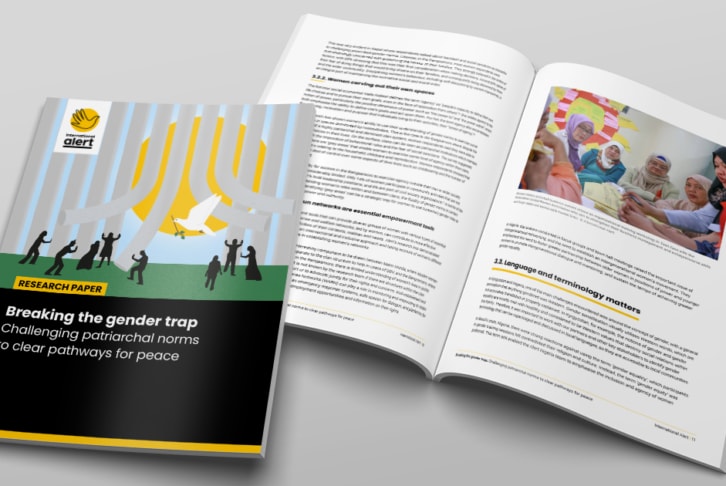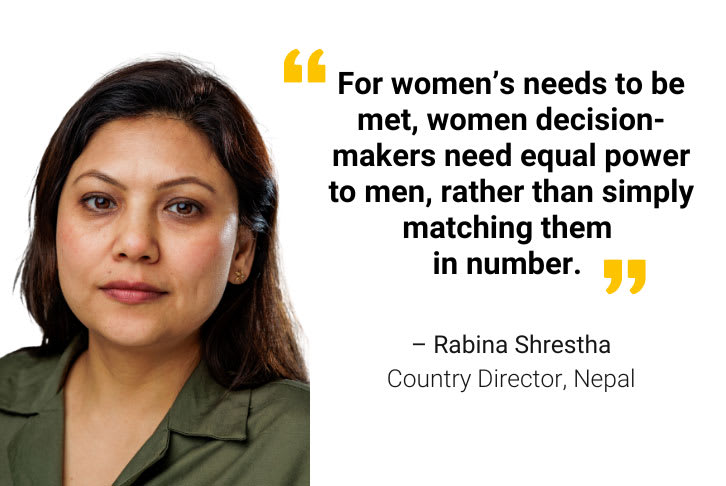Breaking the gender trap: Challenging patriarchal norms to clear pathways for peace
Patriarchal social norms fundamentally shape global, national and local power structures and institutions and consistently prevent pathways to positive peace.
In societies across the world, power is held by men, through cultural norms and customs that favour men and withhold opportunity from women. Such patriarchal norms create narrow and limiting definitions of masculinities and femininities (what it means to be a man or a woman), which leads to gender inequality and trap women in social roles that are subjugated, marginalised and precarious.
As culturally ingrained aspects of society, both women and men reinforce and suffer from the impacts of these rigid roles and behaviours.
International Alert’s latest research in Kyrgyzstan, Nepal, Nigeria and the Philippines has found that peacebuilding is compromised by restrictive patriarchal understandings of gender roles. Each of these countries has developed national action plans on UN Security Council Resolution 1325 on women, peace and security, yet each has struggled to promote meaningful and sustainable gender equality because they are missing programming that transforms discriminatory gender norms.
Our research finds that patriarchal norms must be placed at the heart of peacebuilding to achieve sustainable peace.
Revisit responses to sexual and gender-based violence with a patriarchal norms lens
- To make responses to sexual and gender-based violence effective, patriarchal structures must be addressed. In Nigeria’s Bauchi state, for example, traditional and religious leaders are very influential and cases of sexual and gender-based violence are often handled by Sharia or traditional legal systems. These tend to prioritise settlements between families over the needs of the women and can lead to survivors being made to marry perpetrators.
- In the Philippines, social stigma and discriminatory dispute mechanisms have led to systematic underreporting of gender-related violence. With patriarchal expectations making it difficult for women to come forward, effective intervention to assess and tackle gender-based violence is severely hampered.
Localise language and solutions about gender inequality, making it accessible and relevant without a one-size-fits-all approach
- Finding the right language to promote gender equality and protect women must not be overlooked. Focus groups in Kyrgyzstan found that the concept of gender is generally perceived as a western idea that poses a threat to traditional family relations. In line with the localisation movement within peacebuilding, effective interventions must seek to contextualise concepts. A Kyrgyz linguistic expert was able to develop a Kyrgyz language lexicon developed from work in five conservative Islamic communities across the country. Rooting this work in the local cultural context provided a necessary understanding of what was preventing religious leaders from speaking out against gender-based violence in their communities.
- Women face a complex reality of navigating, negotiating and choosing their path within the parameters of the norms, values, traditions and beliefs into which they are socialised. There is no one-size-fits-all solution. In the Philippines, the response and welfare networks led by women themselves circumvent patriarchal norms and contribute to effective actions that are suited to their specific context, reality and needs.
Numbers alone are not enough to win true gender equality; behaviours must be transformed
- Increasing the number of women political representatives must be done alongside transforming discriminatory gender norms and behaviours to prioritise and implement policies that create gender equality. In Nepal, a quota system has contributed to a rapid increase in women’s representation but not been translated into true equality and inclusion more widely. Women’s participation has been seen as tokenistic and women are still patronised and portrayed as less capable. Patriarchal values have permeated the political institutions and provide an ever-present barrier to women representatives.
Addressing patriarchal norms and the social constructions of masculinities and femininities is critical for achieving gender equality and building sustainable positive peace.
Our teams share how and why we must break the gender trap

Successful peacebuilding relies on addressing patriarchal norms
International Alert Nigeria’s Northeast Programme Manager Mary Hwyere looks at patriarchal norms and peacebuilding in Bauchi state.

Patriarchal norms and pathways to peace
Report author Swechchha Dahal writes for E-International Relations on how gender imbalances are reflected in conflict and block pathways to peace.

Women’s participation must move beyond quotas
On numbers alone, Nepal is a leading example of women’s political participation. But Alert’s Rabina Shrestha warns that without challenging patriarchal gender norms, equality and sustainable peace remain out of reach.






